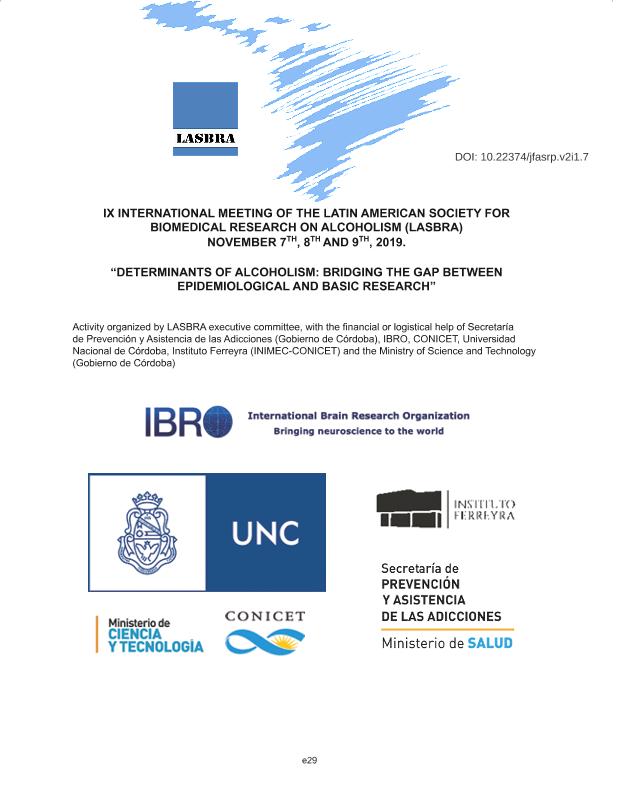Mostrar el registro sencillo del ítem
dc.contributor.author
Vera, Belén del Valle

dc.contributor.author
Pilatti, Angelina

dc.contributor.author
Pautassi, Ricardo Marcos

dc.date.available
2022-07-21T00:12:24Z
dc.date.issued
2019
dc.identifier.citation
ELSA Cohort 2014: Heavy Episodic Drinking Trajectories Among Argentinean College Students; IX International Meeting of the Latin American Society for Biomedical Research on Alcoholism (LASBRA); Cordoba; Argentina; 2019; e64-e65
dc.identifier.uri
http://hdl.handle.net/11336/162694
dc.description.abstract
Introduction: Heavy episodic drinking (i.e., the ingestion 4/5 standard alcohol drinks in one drinking session for women and men, respectively) is prevalent in college students. In Argentina, there is a need to progress from cross-sectional to longitudinal studies to better understand changes in alcohol use during the college years. Trajectory studies generate a progression of behavior and, by accumulating data over time, allow to identify groups that exhibit different patterns of alcohol use across time. Aim: to identify heavy episodic drinking trajectories in Argentinean college students during the first three years of college. Methodology: Sample: participants were 1749 college students (62.6% women) between 18 and 25 years old (M=19.1±1.7) who completed at least two of the 7 data collections carried out over three years. Measures: participants reported frequency of engaging in heavy episodic drinking (from less than monthly to three times a week or more) and the prevalence of several alcohol use indicators: usual quantity, usual frequency and alcohol-related negative consequences. Data analysis: Latent Class Growth Analysis (LCGA) was used to identify the pattern and number of heavy episodic drinking trajectories that best fit the data. Results: we identified five trajectories of heavy episodic drinking frequency: Heavy Stable Frequency, Moderate Frequency, Low Frequency, Infrequent and Descendent Frequency. Two of these five trajectories were relatively stable and three trajectories showed a decreasing slope over time. These trajectories were significant different in several alcohol use indicators. Conclusions: These trajectories partially coincide with those identified in studies from other cultures. In coincidence with previous studies, we identified the high and stable frequency trajectory, the low/near zero frequency trajectory, two moderate frequency trajectories and a descending frequency trajectory. Unlike previous studies, we did not find a trajectory with increasing/ascending heavy episodic drinking frequency. The latter may be related to contextual/cultural variables like differences in the age when the peak in alcohol consumption is reached, the legal minimum age to buy alcoholic beverages, and the idiosyncratic elements that characterize college life in Argentina.
dc.format
application/pdf
dc.language.iso
eng
dc.publisher
Dougmar Publishing Group
dc.rights
info:eu-repo/semantics/openAccess
dc.rights.uri
https://creativecommons.org/licenses/by-nc/2.5/ar/
dc.subject
HEAVY EPISODIC DRINKING
dc.subject
TRAJECTORIES
dc.subject
COLLEGE STUDENTS
dc.subject
ARGENTINA
dc.subject.classification
Otras Psicología

dc.subject.classification
Psicología

dc.subject.classification
CIENCIAS SOCIALES

dc.title
ELSA Cohort 2014: Heavy Episodic Drinking Trajectories Among Argentinean College Students
dc.type
info:eu-repo/semantics/publishedVersion
dc.type
info:eu-repo/semantics/conferenceObject
dc.type
info:ar-repo/semantics/documento de conferencia
dc.date.updated
2022-07-19T15:46:38Z
dc.journal.volume
2
dc.journal.number
1
dc.journal.pagination
e64-e65
dc.journal.pais
Canadá

dc.journal.ciudad
Dundas
dc.description.fil
Fil: Vera, Belén del Valle. Universidad Nacional de Córdoba. Instituto de Investigaciones Psicológicas. - Consejo Nacional de Investigaciones Científicas y Técnicas. Centro Científico Tecnológico Conicet - Córdoba. Instituto de Investigaciones Psicológicas; Argentina
dc.description.fil
Fil: Pilatti, Angelina. Universidad Nacional de Córdoba. Instituto de Investigaciones Psicológicas. - Consejo Nacional de Investigaciones Científicas y Técnicas. Centro Científico Tecnológico Conicet - Córdoba. Instituto de Investigaciones Psicológicas; Argentina
dc.description.fil
Fil: Pautassi, Ricardo Marcos. Consejo Nacional de Investigaciones Científicas y Técnicas. Centro Científico Tecnológico Conicet - Córdoba. Instituto de Investigación Médica Mercedes y Martín Ferreyra. Universidad Nacional de Córdoba. Instituto de Investigación Médica Mercedes y Martín Ferreyra; Argentina
dc.relation.alternativeid
info:eu-repo/semantics/altIdentifier/url/http://jfasrp.com/index.php/JFASRP/article/view/7
dc.relation.alternativeid
info:eu-repo/semantics/altIdentifier/doi/http://dx.doi.org/10.22374/jfasrp.v2i1.7
dc.conicet.rol
Autor

dc.conicet.rol
Autor

dc.conicet.rol
Autor

dc.coverage
Internacional
dc.type.subtype
Reunión
dc.description.nombreEvento
IX International Meeting of the Latin American Society for Biomedical Research on Alcoholism (LASBRA)
dc.date.evento
2019-11-07
dc.description.ciudadEvento
Cordoba
dc.description.paisEvento
Argentina

dc.type.publicacion
Journal
dc.description.institucionOrganizadora
Latin American Society for Biomedical Research on Alcoholism
dc.source.revista
Journal of Fetal Alcohol Spectrum Disorder
dc.date.eventoHasta
2019-11-09
dc.type
Reunión
Archivos asociados
